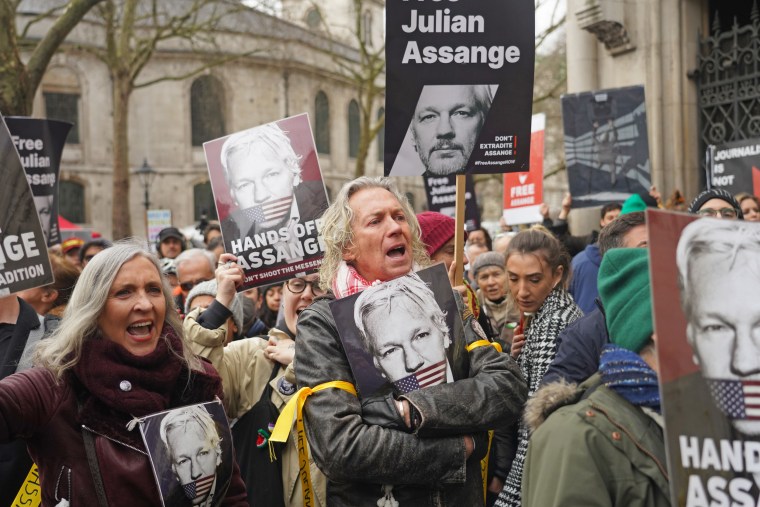Julian Assange wins temporary reprieve from extradition as U.K. court asks U.S. for assurances
WikiLeaks founder Julian Assange was given permission by the High Court in London on Tuesday, to take his challenge against extradition to the United States on espionage charges to a new hearing.
The court ruled that Assange could pursue his appeal at a full hearing, unless the U.S. provided “satisfactory assurances” on the questions of whether he was able to rely on the First Amendment of the Constitution and whether he could be subject to the death penalty. It added that he should not be prejudiced at trial or sentencing “by reason of his nationality.”
“If those assurances are not given, then leave to appeal will be given and there will then be an appeal hearing,” the ruling said. “If assurances are given then the parties will have a further opportunity to make representations.” A further hearing on May 20, will be held to “decide if the assurances are satisfactory, and to make a final decision on leave to appeal.”
Assange has been fighting extradition for more than a decade, including seven years in self-exile in the Ecuadorian Embassy in London and the last five in the high-security Belmarsh Prison on the outskirts of the British capital.
American prosecutors say Assange put lives at risk when he helped U.S. Army intelligence analyst Chelsea Manning steal diplomatic cables and military files that WikiLeaks published almost 15 years ago. He has been indicted on 17 charges of espionage and one charge of computer misuse over Wikileaks’ publication of the classified documents.
James Lewis, a lawyer for the U.S., argued in written submissions that Assange’s actions “threatened damage to the strategic and national security interests of the United States” and put individuals named in the documents — including Iraqis and Afghans who had helped U.S. forces — at risk of “serious physical harm.”
Assange’s attorneys have argued that he engaged in regular journalistic practice of obtaining and publishing classified information and the prosecution is politically motivated retaliation for WikiLeaks’ exposure of U.S. government criminality.
The website, which he launched in 2006 as a place for leakers to drop classified documents, rose to prominence in 2010 when it published a classified video provided by Manning. Recorded three years prior it showed a U.S. military helicopter killing civilians, including two Reuters journalists, in Iraq’s capital Baghdad. When a van arrived to pick up the wounded, it was also shot at. More than 10 people were killed.
Manning was convicted at a court-martial of espionage and other charges in 2013 for leaking secret military files to WikiLeaks. She was sentenced to 35 years in prison, but she was released in 2017 after President Barack Obama commuted her sentence.
Assange’s attorneys have said he could face up to 175 years in prison if convicted, although American authorities have said the sentence is likely to be much shorter than that.
His wife Stella Assange who he wed in prison in 2022 also said last month that her husband’s health had deteriorated during years of confinement. “If he’s extradited, he will die,” she told a crowd outside London’s Royal Courts of Justice.
Assange’s legal troubles began in 2010, when he was arrested in London at the request of Sweden, which wanted to question him about allegations of rape and sexual assault made by two women.

Two year later, he jumped bail and sought refuge inside the Ecuadorian Embassy, putting him out of reach of authorities, but effectively trapping him in the building.
After the relationship soured, he was evicted from the embassy in April 2019 and British police immediately arrested him for breaching bail in 2012, and he has been in prison ever since although Sweden dropped the sex crimes investigations in 2019 because so much time had elapsed.
While a British district court judge ruled against the extradition request in 2021, citing a real and “oppressive” risk of suicide, U.S. authorities won an appeal the following year, after giving a series of assurances about how Assange would be treated if extradited. This included a pledge that he could be transferred to his home country of Australia, to serve his sentence.
The Australian parliament last month called for Assange to be allowed to return to his homeland. Officials have tried to lobby the U.S. to drop the extradition efforts or find a diplomatic solution that would allow Assange to return to his homeland.
Since then, he has remained in British custody, first for breaking bail conditions, then for the pending extradition hearings.
Australian authorities have said the case has dragged on for too long and officials have tried to lobby the U.S. to drop the extradition efforts or find a diplomatic solution that would allow his return to Australia.




